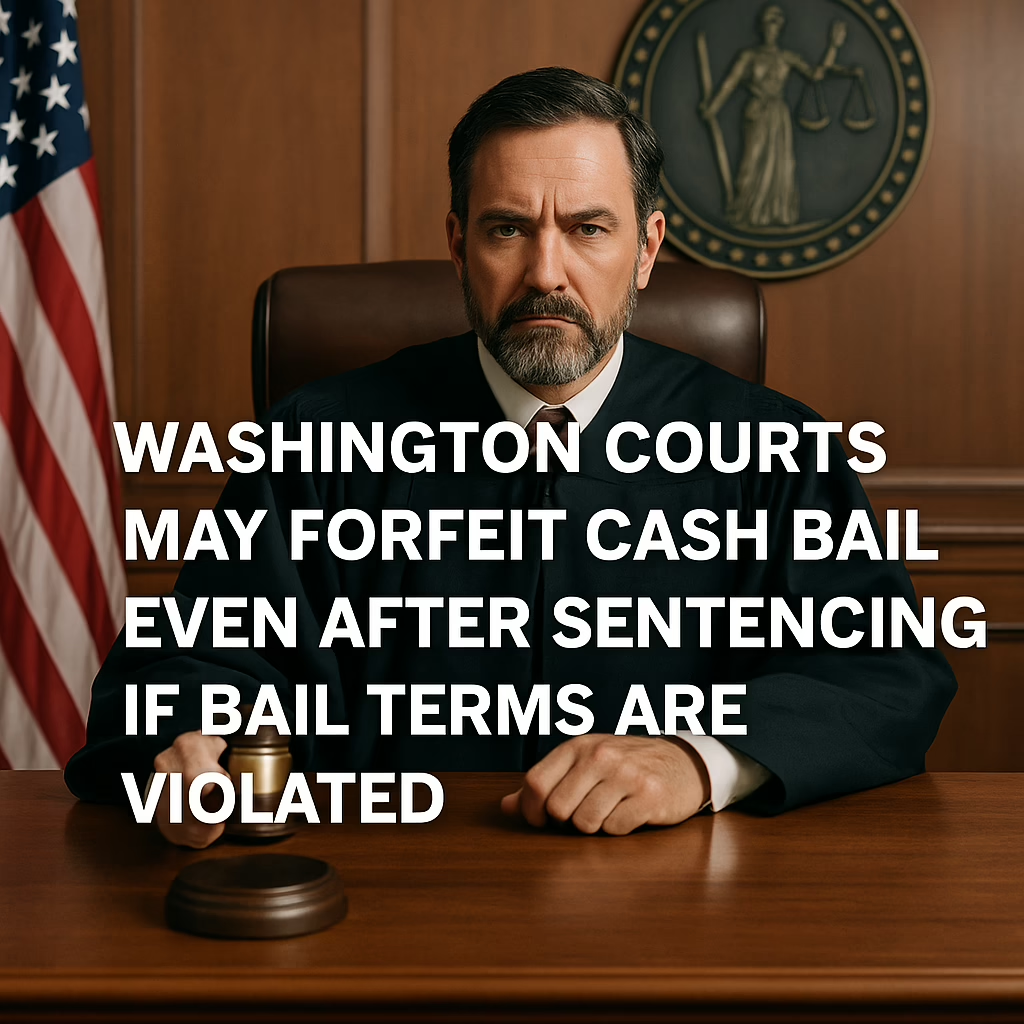In State v. Jeglum (2019), the Washington Court of Appeals clarified that courts retain discretion to forfeit cash baileven after a defendant reappears and is sentenced, as long as the defendant violated the terms of release. This case redefined the limits of cash bail forfeiture in Washington, emphasizing accountability and preserving judicial authority.
Edward L. Jeglum was charged in Chelan County Superior Court with felony stalking and two misdemeanors. He posted $100,000 in cash bail. Despite explicit warnings about appearance requirements, Jeglum failed to appear for a key readiness hearing. To justify his absence, he submitted a fraudulent medical letter, which the court later determined was a misrepresentation.
The State repeatedly requested forfeiture of Jeglum’s cash bail during the proceedings. The trial court issued a warrant but reserved ruling on bail forfeiture multiple times. Even after Jeglum’s guilty plea and sentencing, the question remained unresolved. Eventually, a successor judge denied the State’s motion and ordered the return of Jeglum’s cash bail, relying on State v. Paul to conclude that no discretion remained once the defendant reappeared.
On appeal, the Court reversed. It held that CrR 3.2(o) allows courts to forfeit cash bail for nonappearance or any release violation, and that such discretion continues even after sentencing. The trial court, according to the appellate opinion, misinterpreted Paul, which applied only to defendants who fully complied with bail conditions. Jeglum did not—he failed to appear and committed fraud on the court.
The appellate court emphasized that allowing Jeglum to avoid forfeiture would unfairly benefit someone who evaded justice. It remanded the matter for the trial court to properly exercise discretion and determine whether full or partial bail forfeiture was warranted.
You can read the test of the article here.
⚖️ Legal Implications
The Jeglum decision reinforces that Washington courts maintain the ability to enforce consequences for violations of pretrial release, even after a case concludes. Cash bail forfeiture serves as a tool to promote compliance, deter abuse, and uphold the integrity of the judicial process.
📞 Call to Action
Have questions about cash bail forfeiture in Washington or other criminal law issues? Contact Blanford Law today at ken@blanfordlaw.com or 253‑720‑9304 for experienced guidance.

Additional Resources
- Understanding the Legal Implications of Cash Bail Forfeiture: Insights from State v. Jeglum
This article explores the difference between cash bail and bail bonds, using State v. Jeglum as a key example.
https://blanfordlaw.com/understanding-the-legal-implications-of-cash-bail-forfeiture-insights-from-state-of-washington-v-edward-l-jeglum-is-cash-bail-different-than-bail-bonds/ - Is Cash-Only Bail Allowed? Does Bail Have to Be Bondable?
A breakdown of whether Washington courts can impose cash-only bail and how that differs from bondable bail.
https://blanfordlaw.com/is-cash-only-bail-allowed-does-bail-have-to-be-bondable/ - Does the Trial Court Have Discretion Regarding the Forfeiture of Bail Bonds?
Examines trial court discretion under Washington law in deciding whether to forfeit bail bonds.
https://blanfordlaw.com/does-the-trial-court-have-discretion-regarding-the-forfeiture-of-bail-bonds/ - Soto: Sentencing Enhancements and Unranked Felonies (orphaned link)
Discusses how Washington courts apply sentencing enhancements in cases involving unranked felonies.
https://blanfordlaw.com/53-soto-sentencing-enhancements-unranked-felonies/ - State v. Jeglum – Full Case Text (orphaned link)
Access the full appellate court opinion for State v. Jeglum, including facts, analysis, and the ruling.
https://caselaw.findlaw.com/court/wa-court-of-appeals/1999183.html
